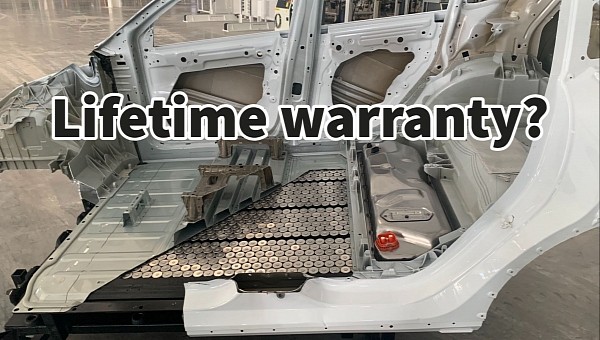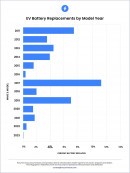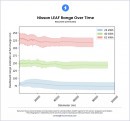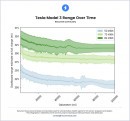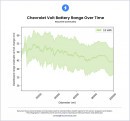Many people think EV batteries wear out as fast as phone batteries, but they couldn't be further from the truth. Once considered among the worst, even Nissan Leaf's batteries can endure for decades without significant degradation. This is one reason why EV battery replacements are quite unusual.
Electric vehicles' value is usually affected by preconceptions about electric cars, the most important being the supposedly limited lifecycle of the high-voltage battery. This also hinders EV adoption because nobody wants to buy a car that will lose its value over time. The bad news is that many scary stories have made many people believe that EV batteries are fragile and expensive to replace. The good news is that they last a lot longer than critics claim, as evidenced in a recent study.
The high-voltage battery is the most expensive component of an electric vehicle, and it's understandable why people are afraid they'd be ruined if anything goes wrong. The fact that one of the first widely available electric cars, the Nissan Leaf, wasn't very good at retaining battery charge helped spread uncertainty about EV batteries. Nissan admitted that the first Leaf batteries used flawed battery chemistry and changed the formula. After that, Nissan Leaf's batteries have proved among the most enduring in the market, showing almost no degradation.
Everyone wants to know how long EV batteries last, but the truth is that we don't know yet. What we know is that they certainly last longer than the time they have been on the market. The best way to assess their projected lifestyle is to observe the apparent degradation of batteries in the cars on the road today. Even this can prove challenging since most EVs have been on the road for less than six years, with almost 30% sold in 2022. Based on current data, carmakers are right to say the batteries could last more than two decades.
Recurrent Auto has analyzed data from 15,000 EV owners to compile one of the most detailed battery studies ever attempted. The main conclusion: EV battery replacements are extremely rare, with only 1.5% of people surveyed replacing the battery outside of a recall or warranty period. Most of them were older Nissan Leaf, which helped spread the legend of unreliable batteries. The study analyzed degradation for 13 electric vehicles, including Tesla Model S, 3 and Y, Chevrolet Bolt, Hyundai Kona and Ioniq 5, and Ford Mustang Mach-E.
One of the study's main takeaways is that battery degradation is not linear. The most degradation occurs in the first 20,000 miles (32,000 km) and then stabilizes as it approaches 100,000 miles (161,000 km). Since the EVs are still new on the market, there is not enough data to assess higher-mileage degradation. Those that got to 100,000 miles still enjoy most of their original range. Recurrent analysts believe modern BMS and temperature control measures have dramatically improved the longevity of the batteries.
The high-voltage battery is the most expensive component of an electric vehicle, and it's understandable why people are afraid they'd be ruined if anything goes wrong. The fact that one of the first widely available electric cars, the Nissan Leaf, wasn't very good at retaining battery charge helped spread uncertainty about EV batteries. Nissan admitted that the first Leaf batteries used flawed battery chemistry and changed the formula. After that, Nissan Leaf's batteries have proved among the most enduring in the market, showing almost no degradation.
Everyone wants to know how long EV batteries last, but the truth is that we don't know yet. What we know is that they certainly last longer than the time they have been on the market. The best way to assess their projected lifestyle is to observe the apparent degradation of batteries in the cars on the road today. Even this can prove challenging since most EVs have been on the road for less than six years, with almost 30% sold in 2022. Based on current data, carmakers are right to say the batteries could last more than two decades.
Recurrent Auto has analyzed data from 15,000 EV owners to compile one of the most detailed battery studies ever attempted. The main conclusion: EV battery replacements are extremely rare, with only 1.5% of people surveyed replacing the battery outside of a recall or warranty period. Most of them were older Nissan Leaf, which helped spread the legend of unreliable batteries. The study analyzed degradation for 13 electric vehicles, including Tesla Model S, 3 and Y, Chevrolet Bolt, Hyundai Kona and Ioniq 5, and Ford Mustang Mach-E.
One of the study's main takeaways is that battery degradation is not linear. The most degradation occurs in the first 20,000 miles (32,000 km) and then stabilizes as it approaches 100,000 miles (161,000 km). Since the EVs are still new on the market, there is not enough data to assess higher-mileage degradation. Those that got to 100,000 miles still enjoy most of their original range. Recurrent analysts believe modern BMS and temperature control measures have dramatically improved the longevity of the batteries.
